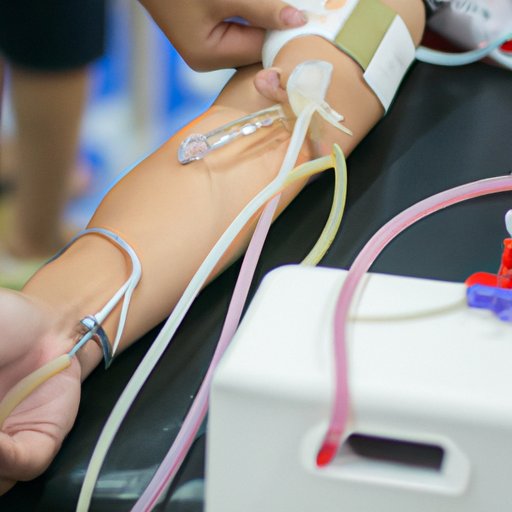
Introduction
Donating blood is an act of generosity and kindness that saves countless lives daily. For some, the idea of giving blood without receiving payment can be challenging. However, the truth is that most blood donors do not get paid for their donations. In this article, we aim to explain why this is the case, explore the benefits of giving blood, and address the ongoing debate over paying blood donors.
Busting the Myth: Why You Don’t Get Paid for Donating Blood
The simple answer is that the FDA banned paying blood donors in the 1970s due to concerns about the safety of the blood supply. Paying donors would encourage them to conceal information about their health, such as high-risk behaviors, which could put recipients’ health at risk. Since then, the Red Cross and other blood donation organizations have relied on volunteers to donate blood.
It’s essential to note that paying donors is not standard practice worldwide. In some countries, such as Germany and Austria, donors do receive compensation for their donations. However, the majority of countries, including the US, Canada, and the UK, do not compensate their donors.
Some people believe that paying donors would increase the number of blood donations. However, studies have shown that this is not necessarily the case. In fact, paying donors can attract undesirable donors, such as individuals who are not interested in donating blood but who can’t pass up quick and easy money. Additionally, paying donors has the potential to undermine the voluntary spirit of blood donation and the sense of community that comes with it.
The Value of Giving: Why You Should Donate Blood, Even Without Pay
Despite not receiving payment, there are several reasons why individuals choose to donate blood. Firstly, donating blood is a selfless act that can save up to three lives per donation. Knowing that they can help others is a strong motivation for many donors. Secondly, donating blood can have some health benefits, such as reducing iron levels in the body, which can be good for individuals with certain medical conditions.
Donating blood can also have a positive impact on mental health. It can promote empathy, kindness, and altruism in donors, leading to a sense of fulfillment and purpose. Additionally, donating blood can bring a community together and foster a sense of belonging.
Behind the Scenes: Understanding the Economic Model of Blood Collection
While blood donation is a not-for-profit activity, there are still costs involved in collecting, processing, and distributing blood donations. Blood centers need to pay for staff wages, equipment, and supplies. They also need to be able to store blood and process it to ensure that the blood collected is safe for transfusion.
The blood industry operates on a supply-and-demand model. Blood centers need to balance the supply of blood with the demand for blood products. They need to collect enough blood to ensure that hospitals have sufficient blood products to treat patients without overcollecting and wasting resources.
Medical Benefits vs. Financial Incentives: The Debate Over Blood Donation Compensation
There is an ongoing debate over whether donors should receive financial compensation for their donations. Supporters of payment argue that it would increase the number of donors, motivate donors to return, and attract younger and healthier donors. Additionally, paying donors could also act as a form of recognition for the time and effort put into donating blood.
However, those against payment argue that it could cause donors to lie about their health status to be eligible and would attract people solely interested in making a quick buck. Additionally, payment could lead to a sense of entitlement and detract from the altruistic nature of blood donation.
There are alternatives to payment that blood centers use to incentivize donors, such as rewards programs or recognition certificates. Additionally, some countries offer donors tax exemptions or other forms of compensation that are not monetary.
Donating Blood for the Greater Good: How Volunteerism and Altruism Impact Public Health
Donating blood is a selfless act that can make a significant impact on public health. In emergency situations, where multiple patients may require transfusions, having sufficient blood on hand can mean the difference between life and death. Donating blood also plays a vital role in treating chronic illnesses such as cancer and sickle cell disease.
Volunteerism and altruism, not just in the blood donation industry, can have a profound impact on society. It can strengthen communities, promote mental health, and address health disparities. Blood donation is an excellent way for individuals to give back and make a difference in the lives of others.
Conclusion
In conclusion, while donors do not receive financial compensation for donating blood in the US, blood donation remains a vital part of our healthcare system. There are numerous benefits to giving blood, including personal fulfillment, community-building, and saving lives. Rather than focus on monetary compensation, we should recognize the critical role that volunteerism and altruism play in promoting public health and strengthen community ties.
So, we encourage everyone who can donate blood to do it! Giving blood is a powerful way to impact the world positively. And for those who cannot donate for whatever reason, we encourage them to support blood donation by spreading awareness and encouraging others to donate blood for the greater good.





